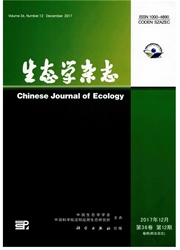

 中文摘要:
中文摘要:
通过测定不同光照条件下(15%透光、30%透光、60%透光、全光)东北次生林主要树种(红松、红皮云杉、胡桃楸、水曲柳和黄波罗)的比叶面积,探讨了不同树种对光照变化的响应与适应。结果表明:不同树种比叶面积存在明显的差异,尤其是常绿针叶树种与落叶树种之间差异显著(P〈0.001),指示不同功能型树种存在不同的生存策略;随着光照强度降低,所有树种比叶面积呈现增加的趋势,尤其是弱光照(15%)和低光照(30%)相对于全光和中光照(60%)差异显著(P〈0.05);不同树种比叶面积随光照强度的变化幅度明显不同,且变化最显著的光照区域也有所不同;不同年龄红松比叶面积的变化趋势一致,但变幅不同,4年生幼苗对光照响应则更为明显。本研究结果表明,所有树种均能通过改变叶形态来适应光照条件的变化,在低光条件下通过增加单位质量叶面积,提高叶片光捕获能力;但各树种对光照强度变化的不同响应则表明树种之间不同的光适应机制,这对森林生态系统内部树种的共生具有重要意义;年龄较小的幼苗对光照的强响应指示其在植物更新过程中叶片水平上生理生态学机理研究中的重要性。
 英文摘要:
英文摘要:
Aimed to understand the responses of the dominant tree species ( Pinus koraiensis, Picea koraiensis, Juglans mandshurica, Fraxinus mandschurica, Phellodendron amurense ) in the secondary forests of Northeast China to the variations of light intensity, their seedlings or saplings were grown under different light intensities ( 15% , 30% , 60% , and full irradiance), with their specific leaf area (SLA) measured. The SLA was species-dependent, and there was a significant difference between evergreen coniferous species and deciduous broadleaved species (P 〈 0. 001 ), suggesting the different life strategies between the two functional groups. With the decrease of light intensity, the SLA of test tree species had an increasing trend, especially at 15% and 30% irradiance compared with at 60% and full irradiance ( P 〈 0. 05 ). There was a large inter-specific variability in the SLA flexibility with respect to light intensity. In addition, the light regimes where the largest variations of SLA occurred were distinctly different. The SLA of P. koraiensis with different ages exhibited the similar variation pattern with light, whereas higher flexibility was observed in relatively young seedlings (4 years old). It was suggested that all test tree species could adapt to the variations of light condition by changing their leaf morphology. At low light conditions, the seedlings would increase their light resource capture ability by enlarging leaf area per unit mass. However, species-dependent responses to light implied the differences in light acclimation mechanisms, which would be very important for the co-existing of different species in forest ecosystem. The greater responses of younger seedlings to light indicated the important role of the seedlings in the study of leaf level eco-physiological mechanism during plant regeneration.
 同期刊论文项目
同期刊论文项目
 同项目期刊论文
同项目期刊论文
 Growth and photosynthetic responses of Fraxinus mandshurica seed-lings to various light environments
Growth and photosynthetic responses of Fraxinus mandshurica seed-lings to various light environments Variation of delta C-13 of wood and foliage with canopy height differs between evergreen and deciduo
Variation of delta C-13 of wood and foliage with canopy height differs between evergreen and deciduo Seed germination of Pinus koraiensis in response to light regimes caused by shading and seed positio
Seed germination of Pinus koraiensis in response to light regimes caused by shading and seed positio 期刊信息
期刊信息
